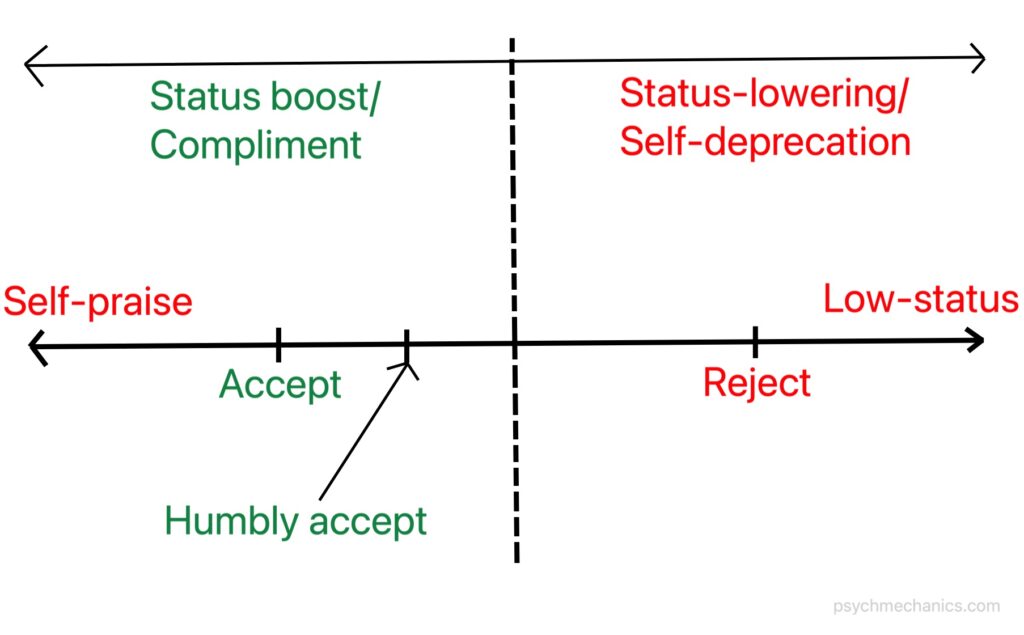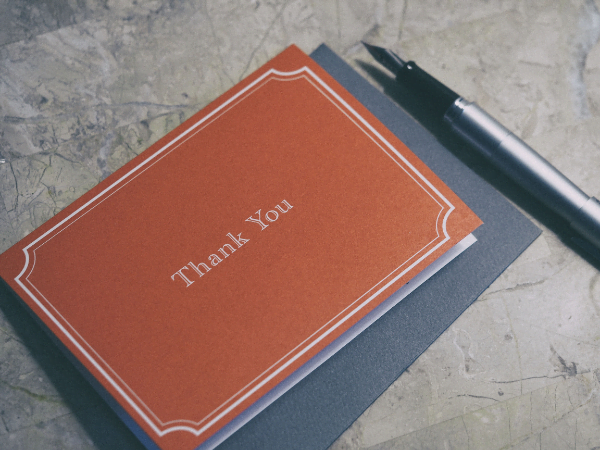A compliment is like a greeting. When you greet someone, you acknowledge their existence and expect them to do the same. You communicate that you value them and want them to value you, too.
The same reciprocity lies underneath the dynamics of compliments.
When someone compliments you, they’re giving you a status boost. They’re raising you in their eyes and the eyes of the audience present.
When someone of high status compliments you, they share some of their status with you. Hence, people crave to be praised by high-status people.
Compliment response spectrum
Say you’re in a conversation with someone. They compliment you out of the blue, and you get a status boost. Now, depending on your response, you can accept or reject the compliment.
The tricky part here is fine-tuning your response so that it lands at just the right spot on the spectrum where you accept the compliment but don’t raise your status to obnoxious levels.
Ideally, you want to stay humble with your response but not so much that you lower your status.

Ways to respond to a compliment humbly
1. Acceptance + Gratitude
The first thing to do when someone compliments you is to accept it. I said earlier that compliments are like greetings. If you don’t accept compliments, it has the same effect on them as when you don’t accept their greetings.
They feel rejected, devalued, invalidated, and unappreciated.
But acceptance has to be paired with gratitude to make it a humble response.
Acceptance alone is better than rejection, but it’s too status-enhancing.
“You look pretty.”
“I agree.”
“You’re so smart.”
“I know.”
Even though the above responses come across as confident, they feel slightly off because they lack gratitude. A lack of gratitude keeps your status boosted, and you’re at risk of entering the self-praise or pride zone.
When you include gratitude in your response, you fulfill reciprocity by acknowledging the compliment and paying something back in return. People who engage in reciprocal social interactions are perceived as less arrogant, humble, and trustworthy.
Humble responses:
“You look pretty.”
“Thank you.”
“You’re so smart.”
“Thanks for saying that.”
In face-to-face interactions, non-verbal signals are a massive part of gratitude. Smiling, leaning towards them, and expressing that you’re pleasantly surprised go a long way to show your acceptance of the compliment.
Rejecting a compliment involves denying, questioning, or downplaying the compliment. While it may feel humble to do so, it’s invalidating and, thereby, a socially inappropriate way to handle compliments.
“You did an awesome job.”
“Oh! That was nothing.” (Downplaying)
“You nailed the presentation today!.”
“Not at all.” (Denying)
“Your new hairstyle rocks!”
“Really?” (Questioning)
These responses are too status-lowering to the point of being self-deprecating. They reek of low self-esteem and self-doubt.
2. Avoiding self-praise
When you’re complimented, you get a status boost and are at risk of entering the self-praise territory. If you let the compliment get to your head, you can succumb to self-praise.
Praising yourself after you’ve been complimented is like getting a double status boost. It’s too much. While it may sometimes appear funny or confident, it’s more likely to generate eye-rolls and cringe responses.
“You’re so good at singing.”
“I’m the best singer in the country.”
“You look handsome.”
“I’m also very intelligent.”
Humble responses:
“You’re so good at singing.”
“Thank you! That’s very kind of you.”
“You look handsome.”
“That was nice to hear.”
3. Repaying the compliment
When done right, returning compliments is an excellent way to handle compliments humbly. You want to do it when you genuinely appreciate something about them, not out of obligation and formality.
Because receiving a compliment triggers reciprocity, people feel pressured to return the compliment as soon as possible. In a hurry, they’re likely to praise something they don’t really appreciate in the other person.
For example:
“You’re beautiful.”
“So are you.”
Are they, though?
If they’re average-looking, everyone in the room, including them, will probably think you said that just to show you’re nice.
Also, even if they are beautiful, it still creates awkwardness because you immediately shift the focus back on them, thereby rejecting their compliment. You left their compliment hanging in the air.
Humble response:
“You’re beautiful.”
“Thank you. So are you.” (Better response with acceptance + gratitude)
4. Sharing credit
Again, this has to be done accurately and genuinely. If someone praises you for work you didn’t do, give credit where it’s due. If some people helped you, share the credit with them.
When you share credit with others who help you, you seem humble. This is why celebrities thank a list of people when they get an award and why authors have an “Acknowledgments” section.
It’s heartwarming to see these high-status people being humble and team players.
“Great work!”
“Thank you! I did it all by myself.”
Even though the above response has acceptance and gratitude built in, the fact that they’re hogging all the credit leaves others feeling off when they hear it.
That’s true, even if they did, in fact, do it all themselves. It’s just a not-so-humble and self-aggrandizing way to handle compliments.
No matter how great your success, there are bound to be people who helped you on the way.
Humble response:
“Great work!”
“Thank you! Couldn’t have done it without my team.”
Be wary of giving away all the credit to others, though. You can’t convey you had no contribution to your success. Then why is it your success in the first place?
Doing so is self-deprecating and makes you look like you’re trying hard to appear humble.
“You were wonderful at the conference!”
“My assistant did everything for me.”
Also, this response also creates awkwardness because it leaves their compliment in the air. You shifted focus to your assistant instead of properly acknowledging the compliment.
Humble response:
“You were wonderful at the conference!”
“My assistant helped me a lot.”
This response is a good balance of acknowledging the compliment and not raising your status too much by shifting the focus to someone else. Even though there’s a lack of gratitude, it still hits the bull’s eye of humility.
5. Focusing on effort vs being special
Self-praise is terrible in almost all circumstances. However, there are rare occasions where it ceases to be off-putting, if not inappropriate, and even inspiring.
Take a look at this clip of rapper Snoop Dogg praising himself:
Most people found this clip inspiring, even though it’s self-praise. Why?
Because he’s praising his hard work and effort, not himself. There’s a difference.
When you praise yourself or your unique personality traits like intelligence, you make others feel inferior. You communicate:
“I’m more intelligent compared to you.”
When you praise your effort, you give others hope that if they put in the same effort, they can get the same results. You communicate:
“I’m not special. You can do it too.” (Humble)
People find effort inspiring, but the reality is success takes more than effort. It also takes intelligence, creativity, and sometimes luck.
But people don’t want to hear that because everyone can’t be intelligent, creative, and lucky. But everyone can work harder.
If he had said in the video, “I wanna thank me for being smart” or “I wanna thank me for being so creative”, it probably wouldn’t have had the same effect on viewers.
6. Avoid dragging the compliment frame
The concept of ‘frames’ is interesting in social psychology. Every social interaction occurs within a frame.
A compliment frame is a status frame involving giving and receiving a status boost. You lower your status if you hold the compliment frame for too long.
Here’s what I mean:
Scenario 1:
Someone compliments you.
You thank them and move on. (You avoid dragging the compliment frame)
Scenario 2:
Someone compliments you.
You thank them profusely. (You drag the compliment frame)
When you drag a frame, you remain stuck in it. People drag frames when they have something to gain from that frame.
If you drag the compliment frame, you show that you need the compliment too much. It shows that you’re not used to getting compliments.
If you get a compliment, accept it, express gratitude, and then move on, you avoid dragging the frame and show that getting compliments is not a big deal for you.
This is why you never see celebrities dragging the frame when complimented. They take compliments graciously, like a high-status person should.
But when they compliment a fan, if they do, the fan goes wild and ‘stays in the frame’ for too long. They’re over-impressed, and it takes them a while to get over it.
“I read your book. It was amazing!”
“Thanks! You just made my day!”
This response, while being honest and gratitude-laden, is also very power-giving and status-lowering. The days of high-status people are already made. They don’t need their fans to make their day.
This is why you never hear a celebrity saying “You made my day” to a fan. They care about their status and image.
Humble response:
“I read your book. It was amazing.”
“Thanks. Glad to know you liked it.” (Moves on to give an autograph)
Note how being glad is less of a status loss than having your day made. Hence, this response lands at just the right spot on the compliment response spectrum.

